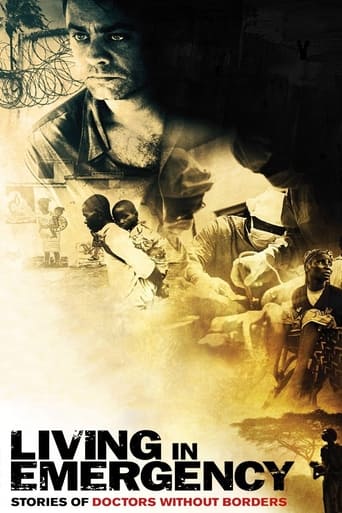Steineded
How sad is this?
Dynamixor
The performances transcend the film's tropes, grounding it in characters that feel more complete than this subgenre often produces.
Jerrie
It's a good bad... and worth a popcorn matinée. While it's easy to lament what could have been...
mdnace
As a doctor practicing in a wealthy suburb of America I found this documentary fascinating, poignant, and troubling. It made me question my work. At a very basic level this is a honest unflinching look at humanity and at the reality the majority of the world faces that many of us are blind to.
Jonathan Pool
Thanks to this documentary, you can see Médecins sans frontières at work in war zones without any promotional polish. You watch bullet wounds, amputations in progress, patients near death, and the agony of not only the patients but also the doctors. They are playing god every day as they decide whom to treat and whom to let die, or are forced to let patients die because the necessary supplies have, yet again, failed to arrive. One revelation is that just about all MSF doctors are chain smokers. Another is that MSF rejects almost all of the doctors who offer to work for it as volunteers. The operation is pretty much one big arbitrary triage, serving about 0.01% of those who need its help. In lucky locales (those with temporary clinics), everybody who shows up gets at least some treatment. Everywhere else (or when the clinics have closed), people just die.The main question not asked: Then why even set up a few emergency clinics in places where medicine can't be practiced well and doctors suffer instant burnout? Why not instead organize airlifts to bring treatable patients to durable care facilities, and train barefoot health workers to reach, vaccinate, and educate the 2 billion people who need them? A couple of doctors gave partial answers to this question, inadvertently. One said that he keeps returning to MSF missions because only by fixing other people can he fix himself. Another said work at an MSF clinic offers him a way to escape from his home world.
rodger-raderman
I saw Living in Emergency at Cinequest. While I'd always heard about Doctors Without Borders, I didn't have a very good understanding of what they did. After seeing this movie, the best way I can describe these people is that they are like mercenaries for good--really bad-ass doctors/people who go into the world's most dangerous war zones to provide medical care where there otherwise would be none. The documentary footage of war and its effects on innocents in Liberia and Congo is very intense and sometimes hard to watch. It's against this background that the stories of these doctors play out. They are fascinating to watch. If you have the chance to see this film, I highly recommend doing so.
richardchenca
What's the goal of a documentary? If it's to capture the truth that the principals face, then this movie succeeds greatly. That's not quite enough for me - maybe I've watched too many normal movies. I wish the narrative had been a little stronger, for the last 10-15 minutes dragged, as maybe filming had to end, but no real event dovetailed with that. So the story such as it is ends in a very real way, but it's not memorably climactic or moving, especially compared to the events depicted earlier, which are stunning, shocking, moving.This is an extremely graphic movie. I can't imagine anyone not turning away during at least two scenes. And it's emotionally raw - I have never seen anything so honest or devastating as this one person's pain. I'd sit through a bad movie just to watch that minute, and I thank the filmmakers for not building up that moment with music or (hopefully) other manipulations.

